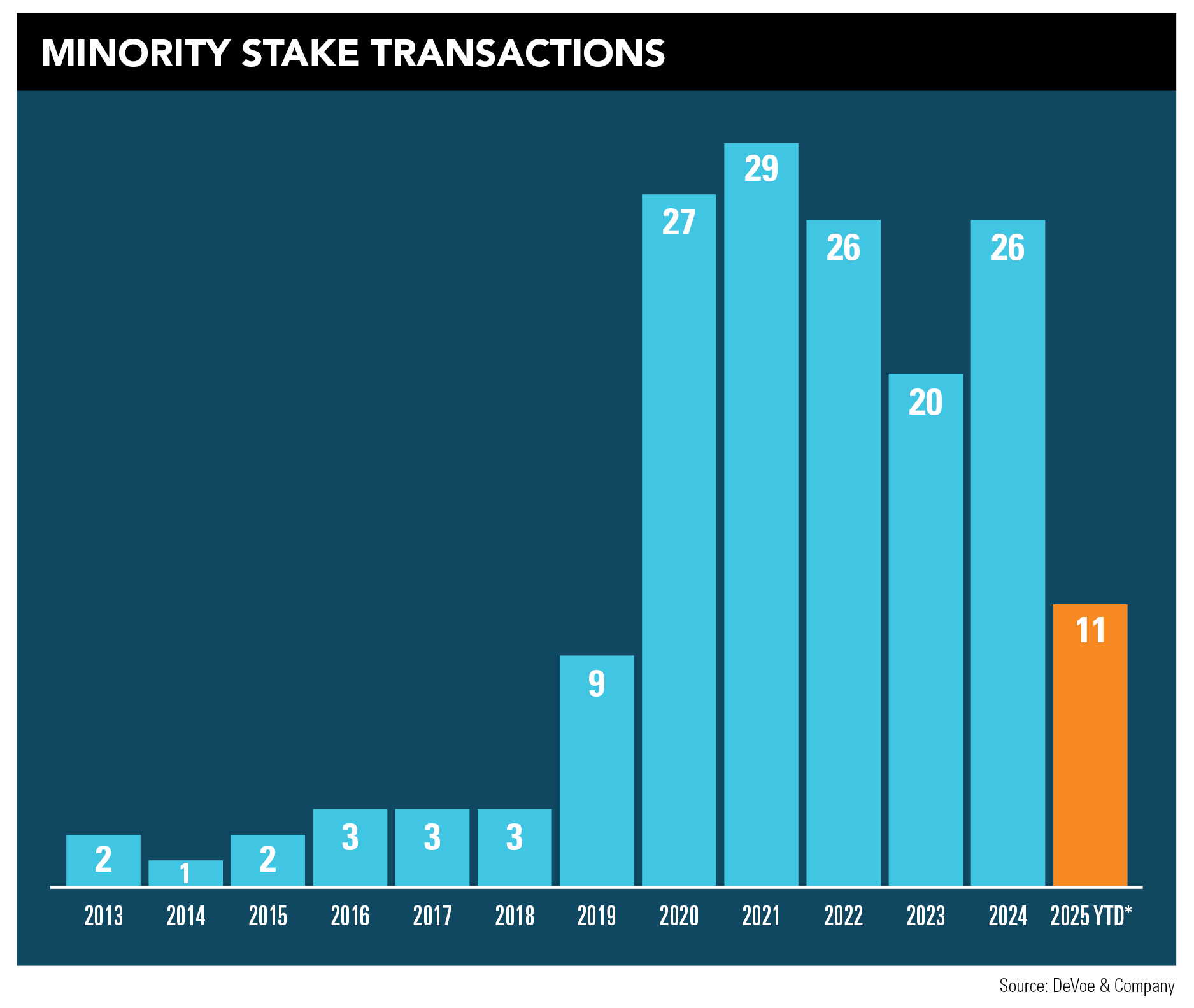

Minority stake transactions mark a smaller portion of total M&A activity among RIAs in 2025 compared to recent previous years, according to new insights from DeVoe & Company. Only 11 minority stake transactions have occurred year to date out of 122 total deals so far.
“Minority transactions surged in 2020 but have since slowed as a percentage of total deals, declining from 17 percent of transactions to 9 percent today,” says David DeVoe, founder of DeVoe & Company, a consulting firm that serves the wealth management industry. “Firms seeking minority capital are typically either solving for liquidity issues related to succession or seeking to fund organic growth.”
“Many firms previously favoring minority stakes have shifted toward full acquisitions,” DeVoe says, with the firm’s latest data including deals through May 27. One example provided by DeVoe was Merchant’s majority acquisition of Summit Financial in Q1 2025 after it had been a minority owner in Summit since 2019. The proportional decline in minority transactions comes after private equity firms fueled 75 total M&A deals for RIAs in Q1 2025, the most active first quarter ever recorded by DeVoe & Company.

Emily Blue, co-founder of RIA M&A advisory firm Hue Partners, says that while advisors look to sell minority stakes in their RIAs to lessen the financial burden as their business grows, advisors are often disappointed in the lack of operational support that comes from minority investors.
“We received a number of calls every month from founders who have a minority investor where the trip doesn’t match the brochure − what they thought they were going to get isn’t what they received,” Blue tells InvestmentNews. “They got the check, but they’re not partnering in the way that they would have liked to or thought that it was going to be. It’s not exclusive to any one particular minority interest investor; we’ve seen it across multiple and so it’s more of a universal [challenge] at large.”
Blue founded Hue Partners in 2024 after spending four years as a dealmaker for the large RIAs Mariner Wealth Advisors and The Caprock Group. Some of the most active investors taking minority stakes in RIAs include Merchant, Emigrant Partners, Hightower, Constellation Wealth Capital, and Wealth Partners Capital Group. Minority stakes typically involve around 20 percent equity sales for firms managing over $1 billion in AUM, according to DeVoe & Company.
“The best advice that I would give somebody that’s contemplating taking a stage of receiving an investment is to really get specific on what your goals are, what are you looking to solve,” Blue says. “Because if it’s truly just taking chips off the table and that’s it, then that might be a great route. But if you’re looking for operational support, thought leadership, inorganic growth support, and future capital, that’s not always going to be the case.”
Minority stakes often allow founders to maintain control of their RIAs, but advisors should understand that selling minority stakes guarantees more future investment transactions.
“It’s one thing to be an advisor looking at investments in a portfolio, but very few advisors are used to being the investment and operating like an investment,” Blue says. “They’re used to looking at investments every day in their clients’ portfolios and assessing if a business or investment is good or bad. But they’re not used to being the investment themselves and having their performance assessed and being held to those growth benchmarks or return benchmarks.”
Among Blue’s teammates at her sell-side firm Hue Partners is Cooper Bricks, who was hired in May from his previous role as VP of corporate development at Rise Growth Partners, an RIA minority investor that is backed by a $250 million stake from private equity firm Charlesbank Capital Partners. Rise was founded by Joe Duran, who sold his RIA United Capital to Goldman Sachs for $750 million in 2019 before Goldman flipped United Capital to Creative Planning.
“There’s very few minority investors that have anyone there other than traditional financial investors − that’s absolutely true,” Duran says. “It was my experience when I was building United Capital that the private equity investors I could get brought very little expertise to anything other than financial structure. They’re very helpful in raising debts and thinking about financial models, but in the business of the brand and building the business, they were not helpful at all.”
Rise’s leadership team spans several national RIA industry veterans, including The Colony Group’s former CMO, Jennifer Geoghegan, former Schwab technology director Jack Morgan, and Schwab’s former EVP of investor services, Terri Kallsen. Rise has thus far made two minority investments in RIAs Bleakley Financial Group and Grimes & Company.
Bleakley had nearly $10 billion in assets, $70 to $80 million in annual revenue, 130 employees, and 40 advisors when the firm received investment from Rise in August 2024, according to Duran. Rise built a five-year plan for Bleakley before signing any investment deal, which included a roadmap for national expansion and converting their 1099 advisors to W2.
“In just nine months, [Bleakley’s] grown to almost $12 billion in assets, over $100 million in revenue,” Duran says. “Over 80 percent of their advisors are now W2 employees; over 80 percent of their revenue is now W2. Their EBITDA has exponentially grown, and they’ve completed two acquisitions and have more coming.
“But here’s the big difference between us and a majority investment. They have made all the decisions. We have a minority stake investment in them, and they get all of our expertise as part of the investment,” Duran says.

Catch-up contributions, required minimum distributions, and 529 plans are just some of the areas the Biden-ratified legislation touches.

Following a similar move by Robinhood, the online investing platform said it will also offer 24/5 trading initially with a menu of 100 US-listed stocks and ETFs.

The private equity giant will support the advisor tech marketing firm in boosting its AI capabilities and scaling its enterprise relationships.

The privately backed RIA's newest partner firm brings $850 million in assets while giving it a new foothold in the Salt Lake City region.

The latest preliminary data show $117 billion in second-quarter sales, but hints of a slowdown are emerging.
Orion's Tom Wilson on delivering coordinated, high-touch service in a world where returns alone no longer set you apart.
Barely a decade old, registered index-linked annuities have quickly surged in popularity, thanks to their unique blend of protection and growth potential—an appealing option for investors looking to chart a steadier course through today's choppy market waters, says Myles Lambert, Brighthouse Financial.
